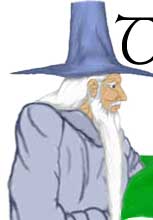Nyáréonié: The Fall of the North
FrodoFriend
« Back to Fan Fiction
The Last Council …
Bronweg tipped his wooden chair back insolently. For a moment Trotter thought the Elfit was going to put his feet on the table, but apparently even his unconventional friend didn’t quite have the gall for that level of disrespect. Trotter himself sat as properly as he could, looking at the faces seated around the table with deep interest. No one was paying much attention to him, and a quietly expectant murmur filled the room.
Trotter and Bronweg sat around a gleaming wooden table in the highest room of the Tower of Seeing. They had put off their travelling clothes and donned plain but clean garments prepared for them by the palace servants. Neither carried a weapon, for it was forbidden for any but the guards and those of the King’s blood to bear arms within the castle. Anna, although Trotter had asked her come, had declined to accompany them and disappeared from her room before he could attempt to convince her again, to his chagrin. The room he and the Elfit were in now was empty of furniture but for the table and the myriad maps hanging on the walls, but it did not seem bare. Trotter felt it was beautiful in its simplicity, the nicest place he had seen as yet in Menechenneth.
It had been two weeks since they arrived in Fornost, and he found that he recognized many of the personages now present at the Last Council, as King Arvedui had pessimistically termed it. Twenty or so people were taking part, representing all the races of Middle Earth. The King himself, stern and grey-haired, sat at the eastern end of the table, facing the door. Thorondil and Galion were also present, as were several other Elves. All were from Lindon; apparently no Rivendell Elves had arrived, although Trotter had heard rumours that the King had sent messengers to Elrond weeks ago.
The King’s sons sat to Arvedui’s right. The eldest was Aranarth; his two brothers were called Arcamion and Aradel. Trotter wondered idly how the Dúnedain picked names for their men-children. Obviously they did not spend much time poring over books of children’s names, as was common among Hobbits. Besides the princes, several other nobles and high-ranking soldiers were present, from both Fornost and Annuminas, the city in the Twilight Hills. Gandalf was also there, without his pipe this time.
“I don’t believe he smokes …” Bronweg said, noticing Trotter’s glance, “You’d think a Wizard would know better.”
“Why? What’s wrong with smoking?” Trotter asked, mildly offended. He was rather fond of pipeweed himself, when it came down to it.
“Nothing, except that it generates frightening hallucinations.”
Trotter stared at the Elfit. “You’ve smoked troll-leaf?” he asked, startled.
“Is that what it’s called?” Bronweg raised his eyebrows, “I’m surprised you Hobbits can stand such stuff. It was awful - after I tried it I thought I was a giant spider for a full twelve hours and kept trying to spin a web with my bowstring.”
“Bronweg,” Trotter said, “We don’t normally smoke troll-leaf. It got its name because one pipe-full can knock down a troll. It’s very dangerous and unhealthy – and in fact, it’s illegal in the Shire. Where and how did you get your hands on some of it?”
“Oh … you know,” Bronweg said evasively, “I wander around, and sometimes things just … come up. Oh, and if you tell anyone about the spider thing I’ll have to kill you.”
“Right,” Trotter said, turning back to the assembled congregation. He wasn’t sure he wanted to know the rest of that story.
There were two empty chairs around the table, he noticed. Who else could be coming? The delegation from Annuminas had already arrived, and all of Arvedui’s chief counsellors were present. Who were they waiting for?
Trotter’s question was soon answered, for at that moment the door on the west side of the room opened, and the two missing members of the council stepped inside. He leaped up, knocking over his chair, shocked enough that he cried out.
“Falathor!” he called, for it was indeed the tall, grave young man whom he had befriended, “You’re alive! You’ve come! But . . . your eye!”
Falathor wore a black patch over his left eye. It made him look rather roguish, and far less respectable than Trotter reminded, but it did not look altogether inappropriate. At the Man’s side was Olin the Dwarf, red beard bristling as ever.
“Hail, Trotter!” Falathor said with a genuine smile, walking over and clapping the Hobbit on the shoulder, “Well met! I am overjoyed to see you again, my friend! And don’t worry about me; I’ve lost an eye, but they’ve started to call me Falathor the Far-Sighted despite that. You were right after all, in the end – but that’s a story everyone will get to hear in a moment. I believe that now everything will come out, and many things will become clear to us. But quiet now! The King speaks!” And he and Olin quickly took their places in the two empty chairs as Arvedui rose from his place.
“I have summoned you here,” said the King, “For one purpose: to decide the future of Arnor, which hangs now by a thinning thread over an deep abyss. This kingdom is in more danger than it has ever been, and I fear greatly that if we do not act immediately all will be lost. We have no time, but we cannot afford to make a mistake. Therefore we must decide today our course of action. Many of you do not know the full state of affairs, and so I will begin by telling you all I know of that which is relevant to our situation.
“As you are all aware, the Witch-King’s realm has pushed to within our very borders. Long years past, in the time of my forefather Arveleg I, he attacked Arnor and nearly destroyed it. Amon Sûl was broken, but Arnor remained, and his strength faded once more. Then for a long time there was a balance of power when neither Arnor nor the Witch-King grew. But now the scales are tipping again, and not in our favour. The Witch-King has found new allies in the wild tribes of men in the North, and many among the men of Rhudaur further east. Orcs have flocked to him out of the mountains. With this power he has stretched his hand all the way to the Weather Hills, which are now held precariously by the Dúnedain. They cannot hold out indefinitely, nor will Arnor if we do not find help soon.
“I have gazed into the palantír, the Seeing Stone of Fornost, and it is dark and will not obey my will. I have sent messengers to Rivendell and Gondor, but they were lost; but a few days ago one of their horses came back, with the bloody heads of all five messengers tied to its saddle. Obviously the Witch-King guessed our purpose and the party was ambushed. Furthermore, word of a fell chieftain who roams the eastern lands has come to my ears. He appeared some weeks ago, and works the Witch-King’s bidding without fail. The people who have coming fleeing from those lands call him the Nine-fingered. But his true name is Lomion, and he is of the Dúnedain, our own people, as will be told in a moment.
“The Elves of Lindon have come to our aid, and Thorondil has promised me that they will send what help they can, but it is not enough to defend Arnor. We must have allies, but our list of friends has grown short. We cannot send a message, and even within this kingdom there are those who would not help us. A messenger has come from Bree to tell of dark deeds in that simple town,” here he gestured at Trotter, “Tell your tale as you know it, Master Hobbit, that it may be known to all present.”
Trotter stood up hastily and began to tell the story from the day of the battle in Bree until his arrival in Fornost. He was careful to include every detail; all eyes were riveted on him, and he could see that his tale was news to most of the listeners. He was interrupted only once, by Aranarth.
“So it was you who wounded the Nine-fingered Captain?” the King’s son asked, “That was a brave deed. The Dúnedain are not light foes.”
“Perhaps it was brave,” Trotter answered, “But I take no pleasure from it. The Man was my friend.” Aranarth did not reply, and so he continued his story.
When he had finished and sat down once more, a disturbed murmur filled the room. It was cut off by Falathor, who stood up and cleared his throat.
“All that the Halfling says is true,” he said, “But the situation has changed now. Bree is no longer under the dominion of a traitor; Lomion has fled the town.”
There were more murmurs of interest at this, and Trotter also cocked his head in surprise, wondering what Falathor had done after he had returned to Bree. It was not long before he found out.
“I returned to Bree after I became convinced that Trotter spoke the truth,” Falathor said, “For I was determined to confront my brother no matter the cost. In the end I paid for my presumption rather dearly,” he said wryly, “But I accomplished my goal – Lomion has left Bree. Hard words passed between us, and we fought. He bested me, but he could not kill me. Perhaps he is not as far gone to the shadow as it seemed at first, for he left me alive and fled that very day. I would have gone after him, but my wound was bad, and I could not ride until some days ago, when I immediately made my way to Fornost. I was unsure if Trotter had arrived safely, and wished to inform the King of the change in the state of affairs.
“I do not know what thoughts are in Lomion’s mind. I suspect that his leaving of Bree did not comply with the wishes of the Witch-lord, and that he in fact meant to escape from the power of Carn Dûm rather than join it. Do not take this to mean, however, that he has repented and is loyal to Arnor once more; it is much more likely that he considers himself an outcast or a free agent, and is merely waiting for a chance to leave the North behind altogether. Before he does so, however, he will go to Tharbad, no matter the danger involved in the venture.”
“Tharbad? Why?” Arvedui asked, “What does he seek there?”
“A … child,” Falathor said. He looked slightly embarrassed. “Allow me to explain. I learned from my mother some time ago that Lomion had once had a lover, a young woman from Tharbad. It was as much as twenty-five years ago, but my brother never forgot the affair; apparently the lady left him against his will. He searched for but never found her. My mother, however, was in contact with the woman, though she had promised never to reveal her whereabouts. But there was something else she never revealed – the lady had a child, a child fathered by my brother. A short time later, the lady left her place of concealment and disappeared. News came to my mother of the poor woman’s death, but she lost all trace of the child.
“A year or so ago, however, she heard strange news from Tharbad, the hometown of my brother’s lover. She revealed to me the affair of the child, and bade me discover what I could about it. I had other business, but I did what I could, and I traced the child to Tharbad. There I lost the trail – Lomion’s child had been banished from the town for murder, and no one knew where it had gone. I know precious little else. I cannot even say whether my brother’s offspring is man or woman, or its exact age.
“What I knew, however, I told Lomion when we spoke. Perhaps it was not the wisest move,” Falathor admitted, “But it seemed necessary at the time. The news struck him hard, and I believe he will seek to go to Tharbad and find the child if he can.”
“This is news indeed,” Arvedui said, shaking his head, “The affairs of my own court are shaking the kingdom. But that is a small matter now, besides the danger to Arnor.”
“Perhaps not so small after all,” said Arcamion suddenly. Arvedui’s middle son leaned his elbow against the table, brushing his coal-black hair out of his eyes. He was shorter than most Dúnedain, and dark; his eyes were black as well. “Lomion has become a serious danger to Arnor. If we could capture him, we would strike a heavy blow against the Witch-King. We could check his other captains and weaken his hold on the eastern lands.”
“And how do you propose to capture my brother?” Falathor asked, “He is quite capable of evading most any ambush or assassin you send against him.”
“Not this assassin,” Arcamion countered, “This one strikes straight to the heart. If we find the child, he will come to us without any effort on our part.”
Falathor was silent for a moment. “You are proposing that we use this child as bait?” he asked, “Supposing we find the unfortunate, what if he or she refuses to cooperate?”
Arcamion shrugged. “It hardly matters,” he said, “We are talking about the security of Arnor here. And I am not proposing that we torture the youth or anything, merely that we keep it under our eye until Lomion comes for it. Then we will deal with him as the circumstances dictate.”
“It is not honourable to use a man’s children against him,” Olin said suddenly, speaking for the first time, “Even if he is a traitor. It’s sneaky and underhanded. Defeat Lomion in battle if you can - but if you cannot, do not turn to the methods of the Witch-King to achieve your ends.
“This is hardly the time to be picky,” Arcamion snapped, understandably offended, “And restrain your wagging tongue! Sneaky and underhanded … if it weren’t for Arnor, your people would have been slaughtered long ago. We keep the might of the Witch-King off you while you shelter safely in the Blue Mountains behind our back!”
“Are you calling the Dwarves cowards?” Olin said heatedly, “Give me an axe and repeat that!”
“Enough!” Arvedui said tiredly, “We don’t have time for this. Lomion must be curbed, and I find my son’s idea good. We must find the child, and let it be known that we are holding it here in Fornost.”
“If you wish it, Majesty,” Falathor said, “I will take up the search. I have already spent some time on the trail, and perhaps that will give me an advantage.”
“Yes, very good,” Arvedui said, looking relieved, “So that matter is settled at least. Now we must return to the main problem: the defence of Arnor. I call upon my Captain of the North Guard to explain the situation.”
A wiry Man at the far side of the table stood up and bowed. “Your Majesty is gracious,” he said, “The problem is the following: we are outnumbered, undersupplied, and cut off from help.”
“Sounds wonderful …” Bronweg muttered at Trotter’s side. Trotter kicked the Elfit under the table; this was hardly the time for sarcastic comments.
“The Witch-king’s forces stand at the feet of the Weather Hills. His last attack was launched three weeks ago, simultaneously with the attack on Bree. Apparently he planned to install his own instruments in the town, effectively cutting Arnor in half by doing so. Bree lies on the crossing of the North-South and East-West Roads, and from there traffic can be regulated between Fornost, Tharbad, the Shire, and Rivendell. We guess that, had Lomion remained in control of the town, all communications would gradually have been cut off. A messenger was sent, also three weeks ago, to request troops from Bree; he never returned. No doubt this was also part of the plan, - to dry up the supply of manpower at the King’s disposal. At the same time the King would remain oblivious to the situation in Bree - since the Witch-King did not rule there outright – and not think to send anyone to investigate.
“This part of the plan, at least, failed, but that failure has hardly bettered our situation. The Weather Hills still hold, but only because the Black Captain has not attacked again. There have been skirmishes, but no major attempts to break through the line. We suspect that the Witch-King is gathering his forces and biding his time for a sudden attack – when, we do not know, but probably sometime in winter, when the North is particularly strong. Currently, his power reaches all the way to the South Downs. The area around the East-West Road, between Bree and Rivendell, is thought to be under the control of the Nine-fingered Captain. No messengers can pass that way, as has been proven, and so we are cut off from both Rivendell and Gondor.
“Once the Witch-King breaks through the Weather Hills, he will sweep without trouble to this city. His forces are too numerous for us to stand a chance. Once he has secured Fornost, the rest of the kingdom will fall without a doubt.”
“Then what is to be done?” asked one of the nobles from Annuminas, “We cannot conjure armies out of thin air! Is Arnor lost already?”
“Hardly,” said Gandalf. Everyone looked at the Wizard expectantly, obviously hoping for a very wise revelation that would solve all of their problems. “And you do not need magic to build armies,” he continued, “Only a bit of logical thought. Yes, the Dúnedain are few, but they are not the only inhabitants of Eriador, in case you had forgotten. In this very room are representatives from your neighbouring lands. I suggest you direct your question at them.”
“Gandalf speaks wisely,” Thorondil said, “I have already discussed this with the King; Lindon stands ready to aid Arnor in every way. We are not a war-like people and most of our craft is spent in ship-building and song-making. But Círdan the Shipwright is mighty, and it is from him that I have come. I bring word from him of the loyalty of the Elves to their younger kin. You can count on our aid.”
“And on that of the Dwarves!” Olin said, not to be outdone by an Elf under any circumstances, “You say we hide in our caves,” he said, glaring at Arcamion, “But soon enough you will be glad of our underground labours. We have forged many weapons over the years: sharp swords, long spears, strong shields. My people are sturdy warriors, and we will march against the Witch-King gladly.”
“And what of the Hobbits?” Arvedui asked, turning to Trotter, “Can the Little People promise aid as well?”
Several people chuckled. Hobbits were not known for their prowess in war, and the other races considered the Halflings to be chubby, cheery, and rather foolish on the whole. Although they were not wrong, they were not exactly right either; there is more to Hobbits than one sees at first glance, and under stress their hidden talents often spring up just in time.
Trotter fidgeted. How did he know if Hobbits would fight? He was only thirty-three, not the Thain of the Marches or anything! And he was not a Shire-Hobbit either; his brethren in the Shire would probably slam their doors in his face if he asked them to fight a battle against the Witch-King.
“I don’t really know,” he said finally, “But I can go and speak to them if Your Majesty wishes. I am sure they will be willing to send food and supplies to Fornost, for the Shire is a rich land and we are a generous people, when approached correctly. Perhaps the Thain will send some archers as well – Hobbits are rather good with bows, in case you didn’t know.”
“You see then,” Thorondil said, “That Arnor is not alone after all. There is more strength here than you think. Still, it may not be enough to defend the North. Therefore this I counsel to you: make fast your strongholds now and prepare a strike. The Weather Hills cannot hold, and it is useless to attempt to defend Arnor against the Witch-King indefinitely. You must strike back now and crush him before he can become more powerful! With our help, you can gather a force strong enough to break Carn Dûm forever. Use what allies you have and Arnor may yet be saved!”
There was much whispering at this speech, and Trotter saw that approval lighted many of the faces present. They were fair and hopeful words, and he felt his own spirit lifting with them. But yet his heart remained troubled; for he looked at Gandalf, and the old Wizard seemed sorrowful and unmoved by Thorondil’s words.
“I do not doubt that your offers are valiant,” Gandalf said when the whispering had died down somewhat, “But I fear that it will not be enough; we must do more or perish. You do not know the power of the Witch-King. Yet your words are wise, and I bid you hold to them and bring aid from your peoples.” He looked at the King, “Build up your armies, Arvedui, and your kingdom may be saved yet. But do not put all your faith in them, for this strength is but a fraction of what rallies beneath the Witch-King’s banners. Therefore this also I counsel: send messengers once more, by the dark and stealthy ways through wood and over plain, to Gondor at least if not Rivendell as well. For if King Eärnil comes in time and adds his strength to yours, the dark forces will be routed and Carn Dûm razed to the last stone.”
“How can messengers reach Gondor in time?” Arvedui asked impatiently, “And who has the cunning and strength for such a journey? I sent trusty men and they failed. The East-West road can no longer be traversed. That leaves only one way: across Minhiriath and Enedwaith. Those lands are uncharted and filled with wild folk and strange creatures. Who can I send now who even stands a chance? A contingent of Elves, perhaps, or of the Dúnedain, but I cannot spare them on so uncertain a mission. Every man is needed here, for you say yourself, Gandalf, that our chances are slim. Furthermore, even if I sent a large force, they would be in great danger. Once the Witch-King became aware of their presence, he would send an ambush immediately. A messenger would have to travel both swiftly and completely undetected, and no force of Men or Elves can accomplish that. ”
The Wizard did not answer to this, but he seemed unperturbed by Arvedui’s questions. In fact, Trotter could have sworn he was almost smiling, as if he knew something the King did not. He wondered what thoughts lived in Gandalf’s head, what plans were formed there and what knowledge buried deep inside. Suddenly, he realized that the Wizard was looking at him, his bushy eyebrows stiff and lowered slightly over his eyes.
A very strange feeling came over him as he looked around at the troubled faces ringing the table. There was the King, and his noble sons, and Thorondil and Galion, the great Elves; Gandalf the Wizard, Olin the stout-hearted Dwarf, and dear old Falathor. And all of them were as helpless as he himself. Or … was he really helpless? What had the King said – “swiftly and completely undetected”? Who attracted less notice than a Hobbit? Suddenly it was as if there was a clear path before him, and all he had to do was take the first step. Was it fate calling, or merely the influence of too much grand talk? His Hobbit-sense assured him that it was the latter and that he was thinking like a fool. He was not a hero … but this was not a hero’s errand. It was a mission of stealth and secrecy, like those his father had always taken part in. His father, from whom he had learned all he knew. And what use was the knowledge if he did not use it, the memory if he did not live up to it?
Trotter stood up firmly. “I will go to Gondor,” he said, “But whatever paths I must take, and I will bring help before the new year if I have to run my feet to the ankles to do it!”
Every eye in the room was fixed on him and for a moment no one spoke. Then Thorondil laughed, but there was no mockery in his mirth.
“Look ye, O Men and Elves and Dwarves mighty beneath the sun!” said the Elf, “Here stands a Hobbit and shoulders a task that daunts even the great! Let no one say that the Halflings are a soft folk living hidden in their small land! For this little one will bear the hope of us all!”
“Indeed, I suspected this might be the end result of the question,” Gandalf said with a smile beneath his bushy grey beard, “Our hope will be in good hands, too, or I’m a Dwarf!”
“That you certainly are not,” snorted Olin, “My good Wizard! But I do not doubt that you speak the truth in this matter. Honour to the Halflings and Trotter of Bree above all!” And he stood up and bowed, taking off his cap in the manner of his people.
“Yes,” said Arvedui, “It deserves much honour indeed, if you can fulfil this task. I thank you for your valiance in taking up this burden, for my hope and my kingdom may indeed rest upon your small shoulders. And so I name you Calacolindo, the Bearer of Light in times of darkness. But you must have companions - you cannot go alone on such a journey!”
“Of course he’s not going alone!” Bronweg said, springing indignantly from his chair, “He wouldn’t even think of it! What are friends for after all? Let none say that Bronweg of Lindon deserted his troth-brother in his hour of need! He will have at least one companion, and not such a useless one, if I don’t say so myself.” He crossed his arms and looked defiantly at the gathered council.
“Nor do I believe that Anna Applethorn will allow you to leave without her,” Falathor said, “Or that you would do well in leaving her. Perhaps my sight is not as true as that of Men of old, yet my heart tells me that you three are inseparable. Your fates are intertwined as that of the Great Jewels. But I cannot guess what that fate will be, and I fear for you, Trotter, though you are bold and not unwise.” Falathor looked at him with troubled brow and a strange pain in his eyes, but he spoke no more, only shaking his head.
“Then the Messengers will be three,” Gandalf said, “And small feet may run as fleetly as great ones. Go swiftly, and by the hidden paths that you may find in the wild. Arnor will stand by its alliance of the peoples – but not forever.”
So at that Last Council was it decided that Trotter Calacolindo, Bronweg the Elfit, and Anna Applethorn were to be the Three Messengers sent in secrecy as the last hope of Arnor for aid from its sister kingdom in the south. Thus was set their path, by fate or by chance or by both those powers who are as the two faces of one coin, through uncertain paths and shadowed wilds across the long miles to Gondor.
Continue to Chapter 8
Back to Fan Fiction | Back to Rivendell Tales | Rivendell Music | The Tolkien Trail









